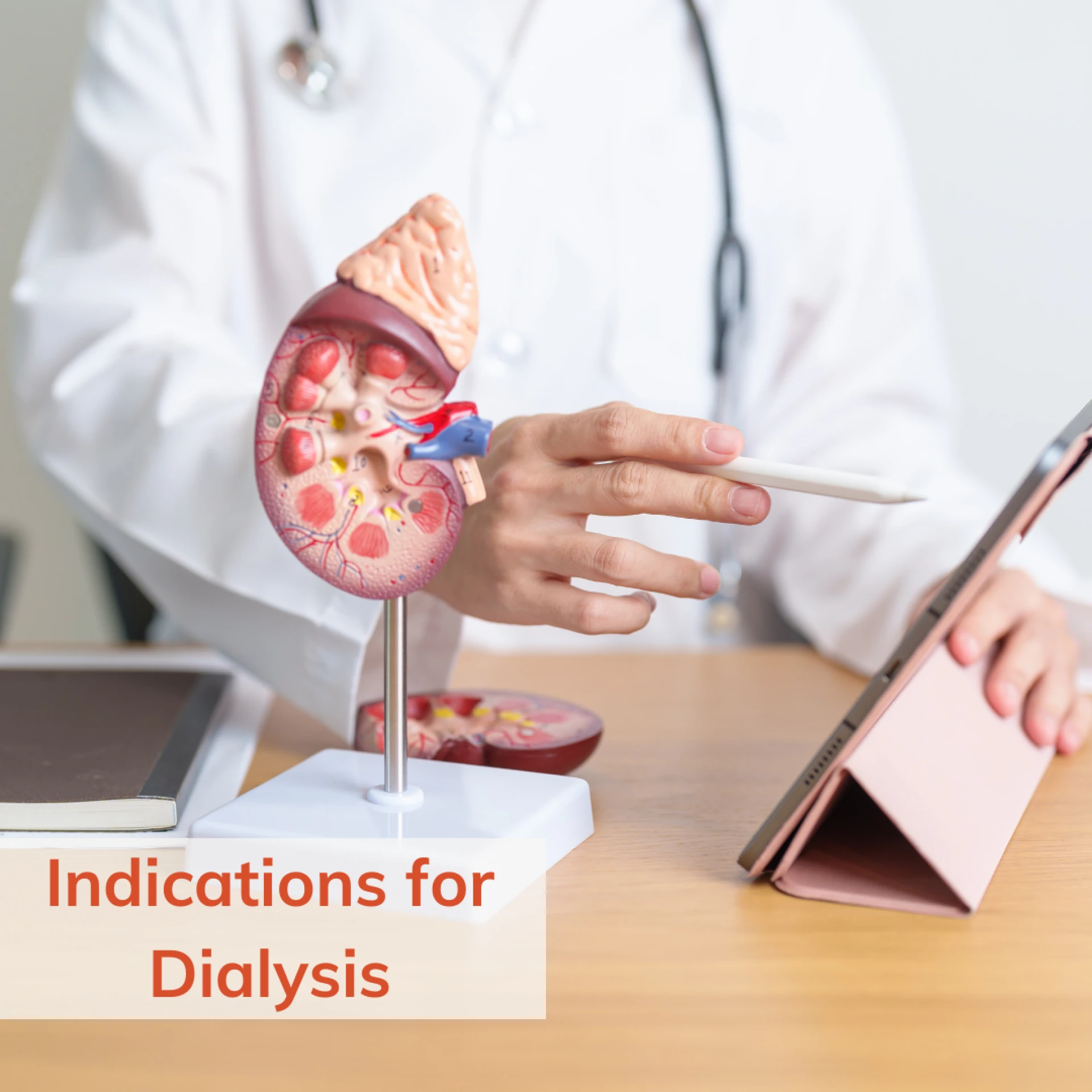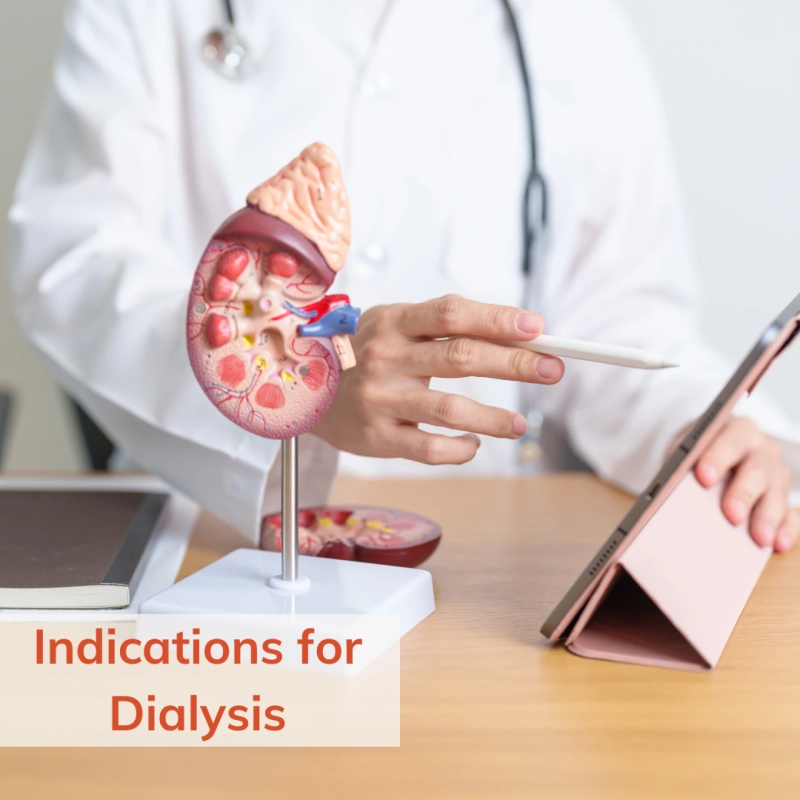Dialysis is a medical procedure that performs the function of healthy kidneys. It helps remove waste products, toxins, and extra fluid from the blood. It is usually recommended for people with either acute kidney injury (AKI) or chronic kidney disease (CKD). Knowing when dialysis is required is important to manage kidney-related issues. Read this blog until the end to explore the notable indications for dialysis and focus on situations where this treatment becomes necessary.

Top Indications for Dialysis
When kidneys fail to maintain the body’s balance, your doctor may recommend dialysis. Here
are some medical conditions indicating the need for dialysis -
1. Acute Kidney Injury (AKI)
Acute kidney injury refers to a sudden loss of kidney function. This condition can develop quickly and may cause severe problems. Dialysis is necessary in the following cases:
- Metabolic Acidosis: This condition occurs when the blood becomes too acidic. Usually, doctors use medications like sodium bicarbonate to neutralise the acidity. If this does not work or there is a risk of fluid overload, dialysis becomes important.
- Severe Hyperkalaemia: High potassium levels in the blood can cause heart problems. When medications fail to control potassium levels, dialysis removes excess potassium from the blood.
- Fluid Overload: Excess bodily fluid can lead to swelling, breathing difficulties, or heart problems. When diuretics (medications to reduce fluid) do not work, dialysis helps remove this fluid.
- Acute Poisoning: Dialysis can remove certain harmful substances like lithium (used in mental health treatment) or aspirin in cases of overdose.
- Uremia: This condition occurs when urea and other waste products build up in the blood. It can lead to serious issues like heart inflammation (pericarditis) or brain problems (encephalopathy). Dialysis removes these waste products and prevents complications.
2. Chronic Kidney Disease (CKD)
Chronic kidney disease refers to a gradual loss of kidney function over time. Dialysis is necessary when the kidneys can no longer filter waste. The indications for dialysis in CKD include:
- Low Glomerular Filtration Rate (GFR): GFR measures how well the kidneys filter blood. Dialysis is needed when the GFR drops below 10-15 mL/min/1.73m². For people with diabetes, dialysis may start earlier.
- Uncontrolled Fluid Retention: Some CKD patients experience swelling and breathing problems due to fluid buildup. If medications cannot control the fluid, dialysis becomes mandatory.
- High Levels of Potassium or Phosphorus: Dialysis removes these harmful substances when they reach dangerous levels.
Symptoms That Indicate Dialysis Is Needed
People with kidney problems should watch for symptoms that might worsen their condition. Symptoms suggesting when dialysis is required include:
- Severe nausea or vomiting
- Loss of appetite
- Swelling in the hands, feet, or face
- Difficulty breathing
- Severe fatigue or confusion
- Chest pain or pressure
- Persistent itching
- Reduced urine output
If you or a loved one experiences these symptoms, visit a dialysis centre to discuss the next steps with a doctor.
3. Types of Dialysis Methods
There are different methods of dialysis. The doctor will recommend the most suitable option based on the patient’s condition.
- Haemodialysis: This involves filtering the blood through a machine. It is done at a dialysis centre or home under medical supervision.
- Peritoneal Dialysis: This uses the lining of the abdomen to filter waste and remove extra fluid. It can often be done at home.
- Continuous Renal Replacement Therapy (CRRT): This process is slower, usually done for critically ill patients in the intensive care unit.
Finding a Dialysis Centre Near You
When choosing a dialysis centre, finding a centre that meets your needs is important. If you search online for dialysis near me, you will find a list of options. Make sure to choose a facility that offers:
- Skilled medical staff
- Proper hygiene and sterilisation
- Convenient scheduling
- Affordable treatment plans
Preparing for Dialysis
Dialysis can seem overwhelming at first. However, with the proper preparation, the process becomes easier. Here are a few tips to help you prepare:
- Learn about the dialysis process and its benefits. Your doctor or dialysis centre staff will guide you.
- Follow the diet and fluid restrictions your doctor recommends.
- Inform your family and friends about your treatment. They can provide emotional support and help when needed.
- Missing dialysis sessions can lead to serious health issues, so stick to your schedule.
Common Concerns About Dialysis
It is natural to have concerns about starting dialysis. Many people worry about its impact on their daily lives. Here are answers to some common questions:
- Will I feel better after starting dialysis? Most people feel better within a few weeks of starting dialysis. It helps reduce symptoms like fatigue, nausea, and swelling.
- Can I work or travel while on dialysis? Many patients continue working or travelling with proper planning. Talk to your doctor about how to manage your schedule.
- Is dialysis painful? The process itself is not painful. Some people feel discomfort during needle insertion, but it is usually minor.
Conclusion
Dialysis is an important treatment for people with kidney problems. It can save lives and improve the quality of life for those who need it. Knowing the indications for dialysis helps patients and their families make the right decision. If you or someone you know shows signs of kidney failure, consult an urologist at UK Nursing Home.


